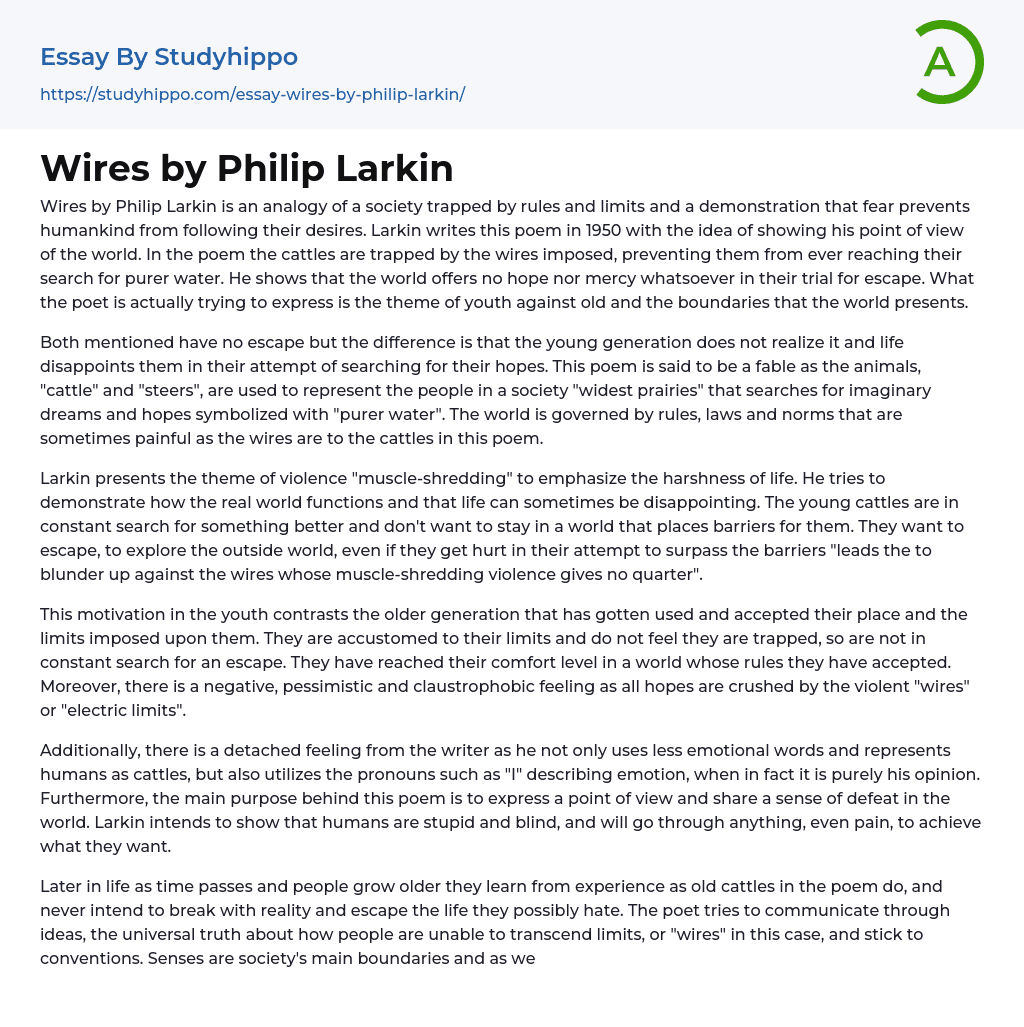Wires by Philip Larkin is an analogy of a society trapped by rules and limits and a demonstration that fear prevents humankind from following their desires. Larkin writes this poem in 1950 with the idea of showing his point of view of the world. In the poem the cattles are trapped by the wires imposed, preventing them from ever reaching their search for purer water. He shows that the world offers no hope nor mercy whatsoever in their trial for escape. What the poet is actually trying to express is the theme of youth against old and the boundaries that the world presents.
Both mentioned have no escape but the difference is that the young generation does not realize it and life disappoints them in their attempt of searching for their hopes. This poem
...is said to be a fable as the animals, "cattle" and "steers", are used to represent the people in a society "widest prairies" that searches for imaginary dreams and hopes symbolized with "purer water". The world is governed by rules, laws and norms that are sometimes painful as the wires are to the cattles in this poem.
Larkin presents the theme of violence "muscle-shredding" to emphasize the harshness of life. He tries to demonstrate how the real world functions and that life can sometimes be disappointing. The young cattles are in constant search for something better and don't want to stay in a world that places barriers for them. They want to escape, to explore the outside world, even if they get hurt in their attempt to surpass the barriers "leads the to blunder up against the
wires whose muscle-shredding violence gives no quarter".
This motivation in the youth contrasts the older generation that has gotten used and accepted their place and the limits imposed upon them. They are accustomed to their limits and do not feel they are trapped, so are not in constant search for an escape. They have reached their comfort level in a world whose rules they have accepted. Moreover, there is a negative, pessimistic and claustrophobic feeling as all hopes are crushed by the violent "wires" or "electric limits".
Additionally, there is a detached feeling from the writer as he not only uses less emotional words and represents humans as cattles, but also utilizes the pronouns such as "I" describing emotion, when in fact it is purely his opinion. Furthermore, the main purpose behind this poem is to express a point of view and share a sense of defeat in the world. Larkin intends to show that humans are stupid and blind, and will go through anything, even pain, to achieve what they want.
Later in life as time passes and people grow older they learn from experience as old cattles in the poem do, and never intend to break with reality and escape the life they possibly hate. The poet tries to communicate through ideas, the universal truth about how people are unable to transcend limits, or "wires" in this case, and stick to conventions. Senses are society's main boundaries and as we grow old we understand and try to cope with the life we carry. In addition, Larkin uses various literary techniques to express this that he feels and thinks. o begin
with, he uses a circular rhyme scheme to show how the young generations repeat the same mistakes as the older generations, and how humans make the same mistake over and over again. The abcd dcba rhyme is a way of showing the enclosure of the cattles inside the wires and the theme before mentioned of claustrophobia. The form in this case supports the meaning of feeling trapped inside the "electric limits" and not being able to escape. As mentioned earlier, the whole poem is an analogy or extended metaphor but specifically a fable as animals are used to represent humans. he "cattles" being the humans, the "prairies" society, "purer water" self satisfaction and the fences the limits the word has to put up with. The poet uses as well enjambment in the verses of "Wires" to emphasize certain words such as "not" (verses 1-3-4) or "wires" (verses 2-4-6), to surprise the reader when suddenly crushing expectations (verses 2-4-5) and to reflect the motion of "steers" (verses 2-4-5) To conclude it can be said that violence and negativity of the world are the essential feelings conveyed and that Larkin is pessimistic, realistic and detached.
He believes that no matter how much effort is placed, things will always be the same and as we grow older responsibilities impose limits on us. It may be argued that his point of view is more realistic than negative as he projects what humans tend to do when they are young and what they become when they are old. Larkin believes society never learns from past errors and although in the beginning humans hate the life that is imposed on
them and try to escape it, they end up compromising and accepting them without fighting. The author does not transmit any hope that a better future is possible.
- Ambition essays
- Anger essays
- Betrayal essays
- Boredom essays
- Confidence essays
- Courage essays
- Desire essays
- Disgrace essays
- Doubt essays
- Empathy essays
- Fairness essays
- Fear essays
- Feeling essays
- Forgiveness essays
- Grief essays
- Guilt essays
- Happiness essays
- Harmony essays
- Hate essays
- Honesty essays
- Honor essays
- Hope essays
- Humanity essays
- Inspiration essays
- Kindness essays
- Laughter essays
- Loneliness essays
- Lost essays
- Loyalty essays
- Need essays
- Passion essays
- Pressure essays
- Pride essays
- Regret essays
- Respect essays
- Responsibility essays
- Sarcasm essays
- Shame essays
- Suffering essays
- Suspense essays
- Tolerance essays
- Bacteria essays
- Biotechnology essays
- Breeding essays
- Cell essays
- Cell Membrane essays
- Cystic Fibrosis essays
- Enzyme essays
- Human essays
- Microbiology essays




